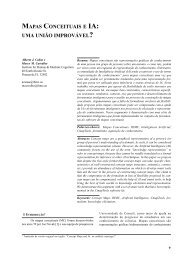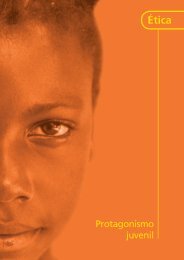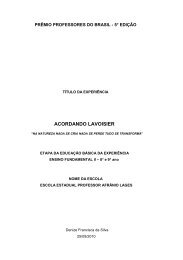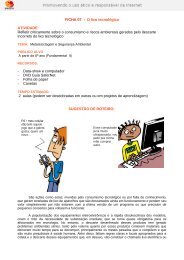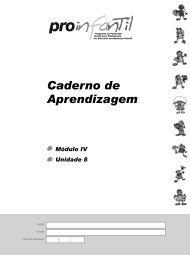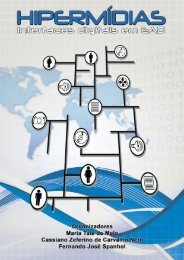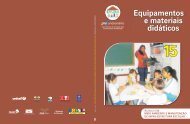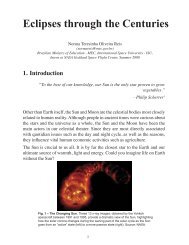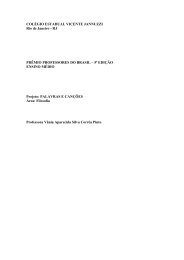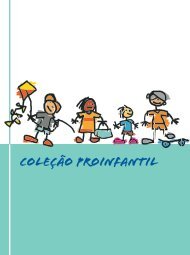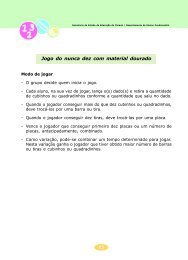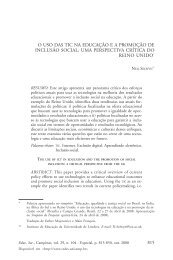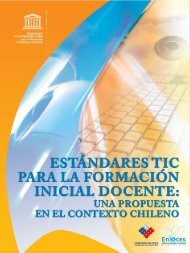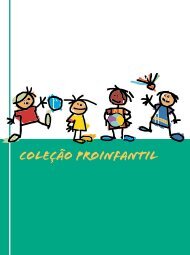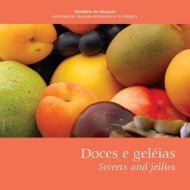BIO-CULTURAL COMMUNITY PROTOCOLS - Portal do Professor
BIO-CULTURAL COMMUNITY PROTOCOLS - Portal do Professor
BIO-CULTURAL COMMUNITY PROTOCOLS - Portal do Professor
Create successful ePaper yourself
Turn your PDF publications into a flip-book with our unique Google optimized e-Paper software.
PART I / CHAPTER 3<br />
It was further emphasized that Article 8(j) as a standalone<br />
provision protects all traditional knowledge of indigenous<br />
and local communities within the mandate of the<br />
Convention on Biological Diversity, including traditional<br />
knowledge associated with genetic resources.<br />
Furthermore, associated traditional knowledge <strong>do</strong>es not<br />
necessarily have to be associated with genetic resources,<br />
as it can also include the use of traditional knowledge<br />
associated with biological resources. 6<br />
The Expert Report also<br />
highlighted the importance of BCPs in regulating access to<br />
TK of ILCs when there is no clear customary law and local<br />
6. UNEP/CBD/WG-ABS/8/2.<br />
7. Ibid, para 35.<br />
8. Ibid, para 60.<br />
9. Workshop report forthcoming.<br />
10. For a copy of the submission contact Natural Justice (www.naturaljustice.org.za)<br />
systems of protection. 7<br />
The Expert Report, like the African<br />
Operational Text, stated that national laws of countries party<br />
to the CBD should uphold BCPs as legitimate statements of<br />
the rights and wishes of ILCs. The Expert Report added that<br />
in situations in which TK is shared between ILCs or spread<br />
across national boundaries or ILCs with different values,<br />
customary norms, laws, and understandings, countries should<br />
encourage and support the development of BCPs in order to<br />
provide potential users of such associated TK with clear and<br />
transparent rules for acquiring FPIC. 8<br />
4. International Vilm Workshop on Matters Related to<br />
TK Associated with GR and the ABS Regime<br />
BCPs were affirmed at the July 2009 International Vilm<br />
Workshop on Matters Related to TK Associated with GR and<br />
the ABS Regime 9<br />
, which was organised by the German Federal<br />
Ministry of Environment, Nature Conservation and Nuclear<br />
Safety. The Workshop had invited ILC representatives to jointly<br />
prepare for and provide input to Parties in the forthcoming<br />
negotiations at WGABS 8 in Montreal in November 2009.<br />
The ILC representatives under the head of “Measures to<br />
Ensure that Access to TK Takes Place in Accordance with<br />
Community-level Procedures” proposed operative text for<br />
the IRABS that requires States to facilitate the development<br />
of BCPs with the full and effective participation of bio-cultural<br />
communities to prevent the misappropriation of their TK.<br />
They stated:<br />
The legitimate indigenous or local authorities shall provide<br />
potential users of traditional knowledge with clear information<br />
on how to obtain FPIC (free, prior and informed consent) and<br />
negotiate MAT to traditional knowledge based on communitylevel<br />
procedures, customary laws and/or community protocols.<br />
Parties shall, with the full and effective participation of the<br />
indigenous peoples and local communities concerned,<br />
<strong>COMMUNITY</strong> <strong>PROTOCOLS</strong> IN THE NEGOTIATIONS OF<br />
THE INTERNATIONAL REGIME ON ACCESS AND BENEFIT SHARING<br />
support and facilitate local, national and/or regional<br />
community protocols regulating access to genetic resources<br />
and associated traditional knowledge, taking into<br />
consideration the relevant customary laws and ecological<br />
values of indigenous peoples and local communities in order<br />
to prevent the misappropriation of their associated TK. If an<br />
agreement on access to genetic resources and/or traditional<br />
knowledge has been reached between an indigenous people<br />
or a local community and a user, when applicable through an<br />
Indigenous Peoples’ Competent Authority and/or the use of<br />
community protocols, the existence of the agreement shall be<br />
registered with the competent national authority. 10<br />
Participants at the workshop debated the ILCs’ submission<br />
and despite questions relating to their exact operation and<br />
future standing under the IRABS, the concept garnered<br />
broad support.<br />
40



